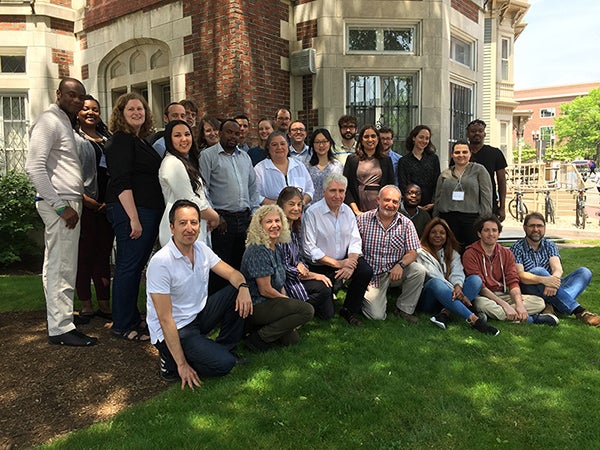A team of researchers on the “Health and Aging in Africa: A Longitudinal Study of an INDEPTH Community in South Africa” (HAALSI) project have published their findings in the Journal of Aging and Health.
When is the best time to prevent early childhood obesity?
Harvard Pop Center faculty members Tracy Richmond, Mauricio Avendano, and Ichiro Kawachi, along with their colleague Inyang A. Isong, have published a study that takes a longitudinal look at the weight and growth status of kindergarten-aged children from various racial/ethnic backgrounds.
Mother’s education level linked to child’s risk of obesity
A mother’s education level has been found to be linked to her offspring’s body mass index (BMI) as early as three years of age in three European countries. The recent findings by Harvard Pop Center affiliates (faculty member Mauricio Avendano, Bell Fellow Emilie Courtin, and former visiting scientist Cathal McCrory) and their colleagues have been published in Paediatric and Perinatal Epidemiology, and the study has received attention in the news……
Continue reading “Mother’s education level linked to child’s risk of obesity”
Can a good marriage help fight the battle of the (midlife) bulge?
Researchers have found that those who feel supported in their marriages were more likely to be at a healthier weight in the midlife years. Harvard Pop Center Director Lisa Berkman, and faculty members Ichiro Kawachi and Laura Kubzansky are authors on the study published in Health Psychology.
Focusing on BMI: A novel study to better understand variations in individual health within a given population
Harvard Pop Center research fellow Rockli Kim, ScD, is lead author on a study published in the European Journal of Epidemiology that aims to help reduce health disparities by comprehensively examining individual heterogeneity in women’s BMI using data from 57 low- and middle-income countries.
Youths getting too much screen time face increased exposure to obesity-related risk factors
Harvard Pop Center faculty member Steven Gortmaker, PhD, is co-author on a study that has found that teens who spend 5 hours or more per day behind a screen (e.g., tablet, computer, videogame, smartphone, television) face greater exposure to obesity and/or risk factors for obesity such as increased sugar-sweetened beverage consumption, and inadequate physical activity and sleep.
Early childhood social disadvantage linked to risky health behaviors in adulthood
A new study by former Harvard RWJF Health & Society Scholar Amy Non, and Pop Center faculty member Laura Kubzansky published in the Annals of Human Biology finds that children who experienced early social disadvantage were, as adults, almost four times as likely to smoke, three times more likely to be obese, and almost five times more likely to drink alcohol excessively (women only).
Schools’ influence on BMI lasts long after graduation
It is well known that adolescent body mass index (BMI) shows school-level clustering. And now a new study by SV Subramanian and Adam Lippert shows that years after leaving school, respondents’ BMIs are persistently clustered by the school they attended during adolescence. The study was published in Journal of Epidemiology and Community Health.
Amount of crime perceived and reported by adolescents is connected to their BMI and activity levels
Ann Forsyth was recently lead author on a paper titled “Perceived and Police-Reported Neighborhood Crime: Linkages to Adolescent Activity Behaviors and Weight Status.” Published in Journal of Adolescent Health, the study addressed the relationships of perceived and objective reports of neighborhood crime to adolescent physical activity, screen media use, and BMI. BMI was positively associated with perceived crime among girls, reported crime in girls, and perceived crime in boys.
In India, is child’s BMI influenced more by mother’s BMI than father’s?
Harvard Pop Center faculty member S V Subramanian (Subu), PhD, and former Harvard Bell Fellow Daniel Corsi, PhD, are co-authors on a paper published in Archives of Disease in Childhood that explores the fetal roots of body mass index (BMI) in India.

